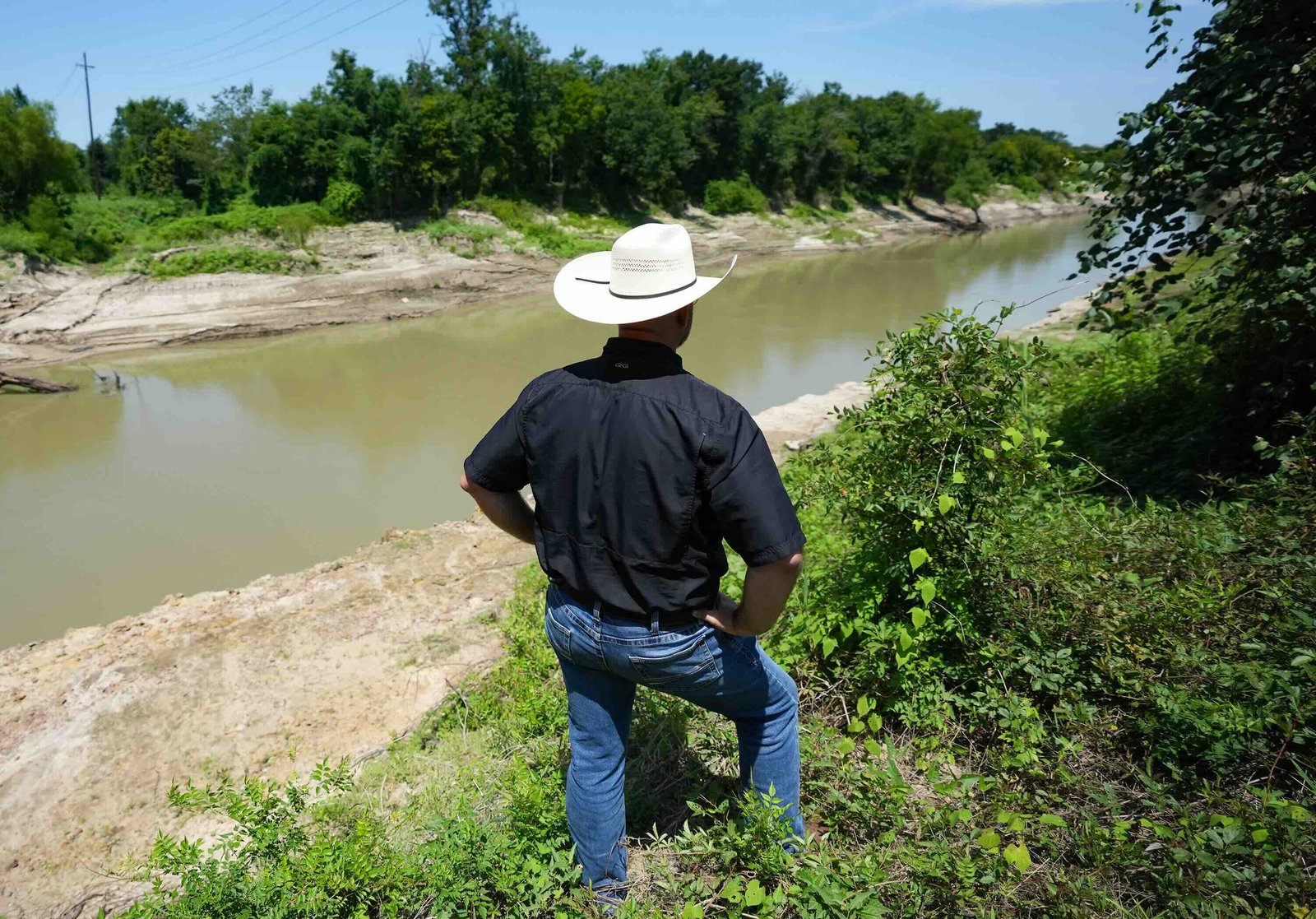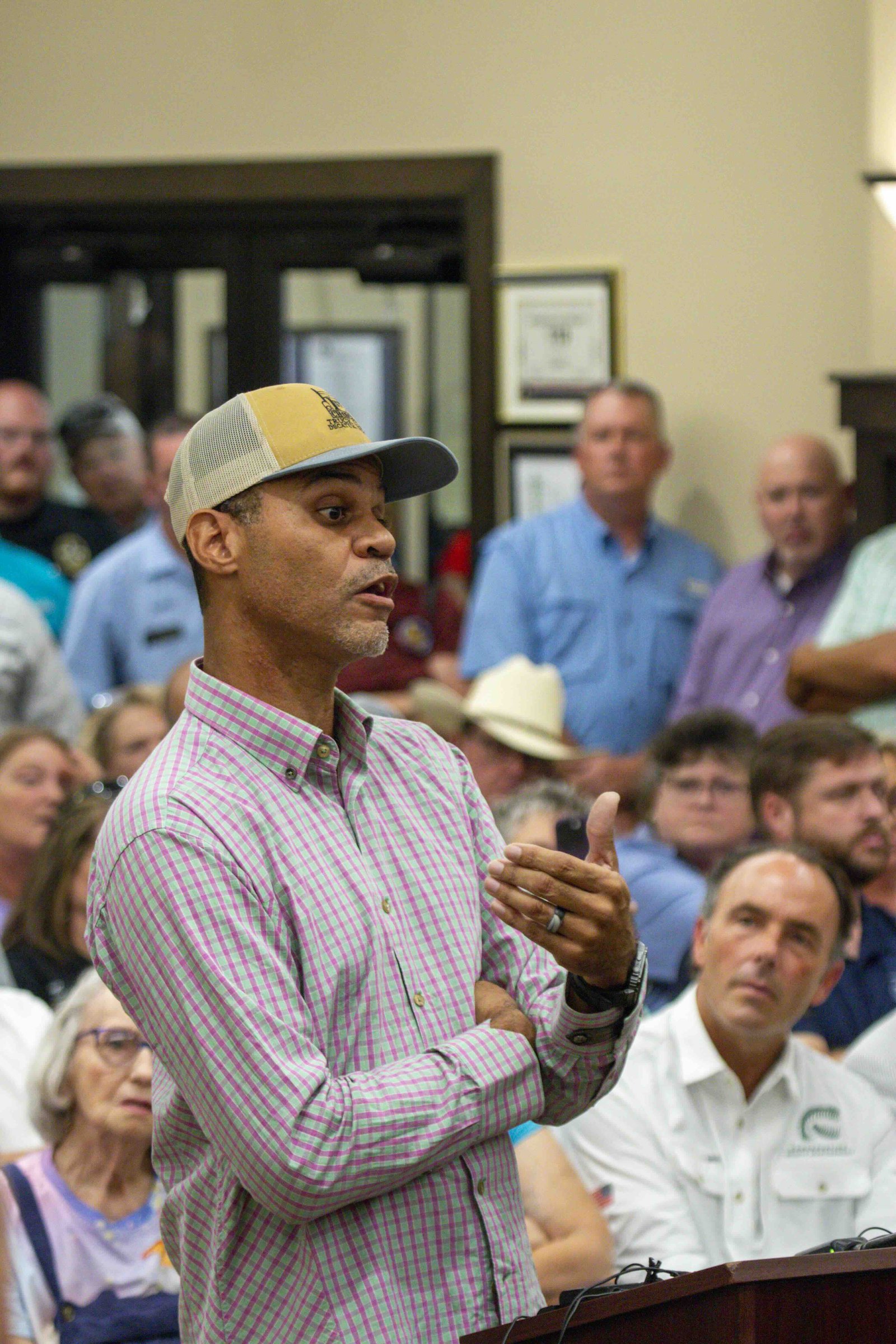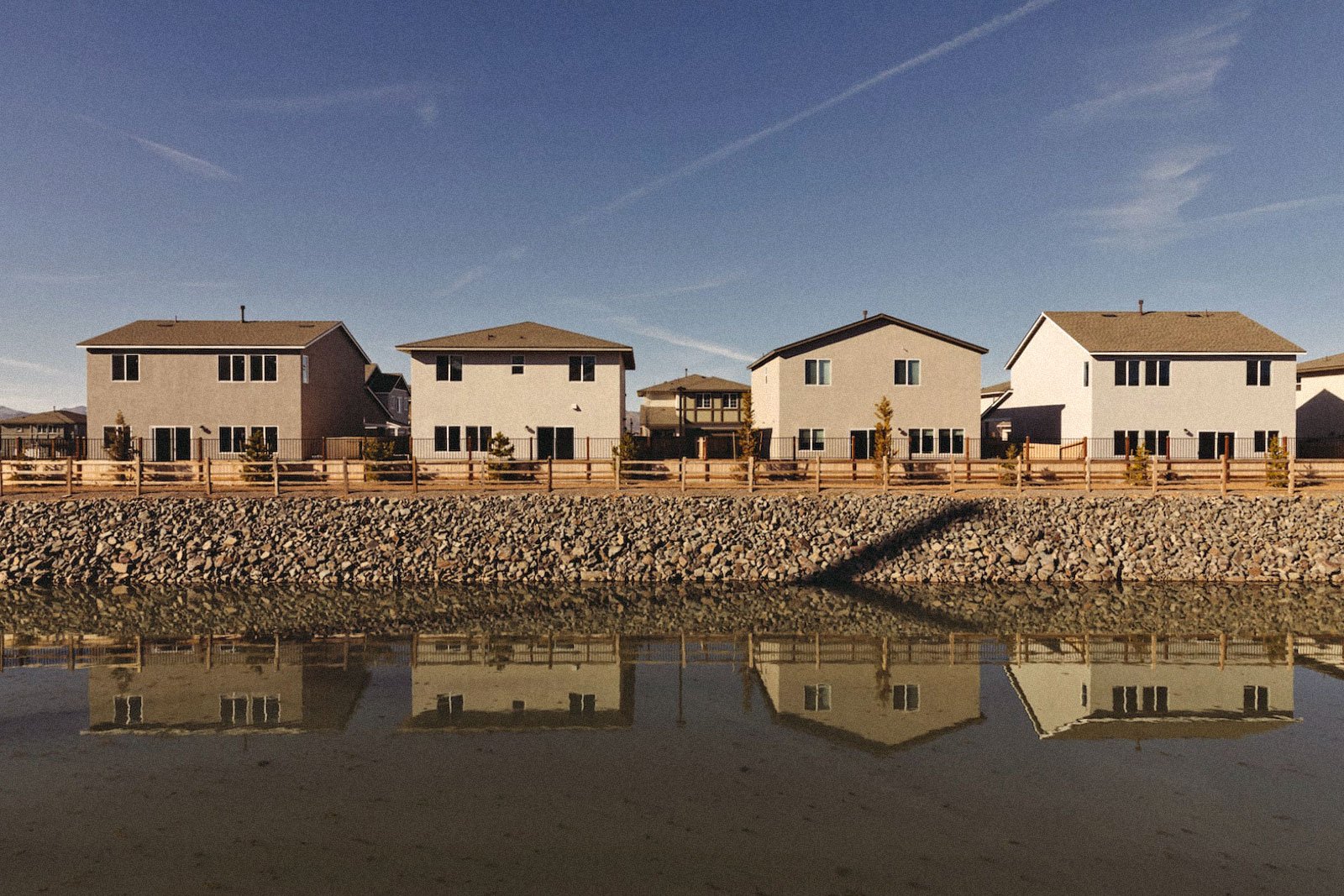The farmers and ranchers who descended on City Hall in Jacksonville, Texas, had been told to “leave their pitchforks at the door.” While everyone ultimately arrived unarmed, the attendees of the June 19 board meeting of the Neches & Trinity Valleys Groundwater Conservation District were ready for a fight.
In the hallway outside the boardroom, wives tried to cool their husbands with handheld paper fans that flapped uselessly amid a sea of silver hair — stoic men with sweat-slicked brows beneath weathered cowboy hats, veterans’ insignia, and red MAGA ball caps. Near the chamber door, a uniformed officer stood sweating through his shirt, trying to enforce the fire marshal’s 150-person limit while the crowd swelled behind him. The sign-in table, barely visible through the crush, had already collected nearly 100 names — almost all were there to speak out against the water permits requested by two shadowy LLCs tied to hedge fund manager Kyle Bass and his investment group, Conservation Equity Management Partners.
The permit applications submitted by Bass’ Redtown Ranch Holdings LLC and Pine Bliss LLC collectively request permission to withdraw approximately 15 billion gallons of water annually from the Carrizo-Wilcox aquifer in East Texas, an amount residents fear will run their wells and farms dry. Without taking off their “Don’t Tread on Me” T-shirts, the citizens of six East Texas counties where Trump took around 80 percent of the vote last November are now turning to their state government to protect them from billionaires.
Reid Bader
Jacksonville sits about two hours southeast of Dallas. With a population just shy of 15,000, it’s the largest city in Cherokee County, one of the three counties represented by the Neches & Trinity Valleys Groundwater Conservation District. The trees in the county are lush and tall, and the Neches and Trinity Rivers gently flood the landscape with a predictability that local farmers use to their advantage. The county’s tight-knit residents typically vote Republican, they’ve told me over the years, to protect their freedom from government overreach. But as they watch water conflicts breaking out all over Texas, they feel their communities are being overwhelmed by heavy industry and profiteering. Some locals have started making the case that it’s not government overreach for the state to step in when the fight’s not fair.
Melisa Meador, who identified herself as a wife, mother, Christian, and pecan farmer with 600 acres near Bass’ Redtown Ranch — one of the LLCs looking to pump groundwater — took a prophetic tone in her testimony to the conservation district board. “Those who endlessly accumulate sow the seeds of their own destruction,” Meador said at the podium with the cadence and poetry of a revivalist. “Today’s water barons join river to river, well to well, until all water flows through their meters. Their thirst for profit can never be quenched.”
For his part, Bass feels he’s being mischaracterized. “I’m not coming at this as a robber baron, and I’m not coming at this as someone who intends to do any harm whatsoever,” he told me in the hall after taking a break from being public enemy number one inside the Jacksonville boardroom. “If they come back to me and say, ‘You’re going to do harm, you need to reduce your permit,’ I’m a very reasonable person.”
He’s not shy about his intentions for the water, though he insists that he does not already have buyers lined up. The water, should he get it, could be transported out of East Texas to any number of bone-dry cities west of the Carrizo-Wilcox. Unless the government wants to hang a “closed-for-business sign on I-35,” he said, there has to be some solution to the statewide water shortage. Really, he said, the amount of water he’s talking about exporting is a drop in the bucket — less than 1 percent of what the state needs.
Reid Bader
“I mean, we’re talking about a large amount of water in this area, but a very small amount of water as it relates to the state,” Bass said. “The state has a real problem.”
He’s right. Droughts have always been part of Texas weather, but with climate change, they’ve grown longer and hotter. Meanwhile, increasingly unpredictable torrents of rain are flooding canyons and tributaries but doing little to refill the aquifers under parched, hard land.
West Texas is getting drier, heading toward all-out catastrophe for high desert cities and the state’s treasured spring-fed rivers. The Panhandle and Gulf Coast are scrambling for new water sources as agriculture and industry outpace local basins and aquifers. As drought conditions persist, the primary urban corridor, Interstate 35, has boomed with massive, thirsty tech companies that exhaust local water supplies in metropolis-adjacent exurbs. And the Edwards Aquifer — the massive limestone tank under southwest Texas — cannot support more growth, rendering San Antonio desperate for imported water. Like ravenous wolves, the thirsty cities are on the prowl for water. And there, underlying the lush forests and riverbeds of East Texas, sits the Carrizo-Wilcox — a big, juicy pig, with no one standing guard.
San Antonio struck first, running its 140-mile Vista Ridge pipeline and pulling 16 billion gallons per year from the Carrizo-Wilcox, causing wells in some rural counties to sputter. Fast-growing Austin suburbs also began sinking proverbial straws into their surrounding counties, laying pipe to keep up with exploding development. In Lee County, just east of Austin, the San Francisco-based water asset management firm Upwell Water announced plans to build a pipeline so big that the cities of Bryan and College Station, along with Texas A&M University, jointly filed suit to stop what they see as a groundwater grab.
There’s more to the pipeline palooza than just competition for scarce resources. There are also fortunes to be made. Conservationists, well drillers, and even industry insiders have started comparing the rush on the Carrizo-Wilcox to the oil frenzy of the Texas Permian Basin or the California gold rush. But this time, the boomtowns won’t spring up next to the pumps. The real fortunes — and the real growth — are happening hundreds of miles away, in cities that may never lay eyes on the rural wells quenching their thirst.
Sitting on top of a gold mine doesn’t mean that every resident of East Texas could be about to strike it rich. The infrastructure to pump and export billions of gallons of water is more than most farmers and ranchers could afford — so they can’t drain their own land. Nor will water exporters need to pay them top dollar for their largest tracts. All an exporter needs is a couple of acres and some antiquated property rights.
In Texas, landowners enjoy the “rule of capture,” a doctrine based in Roman and Old English law giving them the right to harvest whatever groundwater flows under their property, even if it causes problems for their neighbors. This regularly did cause problems between neighbors — especially if one neighbor was an industrial farmer — so in 1940, Texas established groundwater conservation districts to serve mostly as monitors and arbiters. As regulatory bodies, they are ill-equipped to impose strong enough penalties to stop an operation like Bass’. District boundaries often follow county lines, a demarcation which, many have pointed out, means nothing to the water flowing below. If the district tells you no in one county, you can just go next door.
Some in Texas, including some Republican lawmakers, would like to see that change. Following the June 19 meeting in Jacksonville, the Neches & Trinity Valleys Groundwater Conservation District ultimately opted to kick Bass’ permit request to the State Office of Administrative Hearings, a referee in complex regulatory fights that’s intended to give citizens, companies, and government entities a legal forum for high-stakes disputes — like who gets to pump 15 billion gallons of East Texas groundwater. The hearing has yet to be scheduled, in part because of lawsuits filed by many of the people and businesses who could be affected. But the outcry in Jacksonville sparked a growing awareness that every single Texas politician represents one of two kinds of places: districts that need water, or those that stand to lose it.

Elizabeth Conley / Houston Chronicle via Getty Images
“We cannot compromise one region for another,” state Representative Cecil Bell said to another packed room, this time at the Texas Capitol in Austin. The House Natural Resources Committee convened on July 15 specifically to talk about Bass’ permits, but found themselves wrestling with the statewide dilemma as well. The 11-hour hearing was like a marble and brass version of the Jacksonville meeting, complete with air-conditioning problems in the Capitol annex. Many of those who showed up in cowboy hats to Jacksonville were now in suits and ties. In addition to the 13 members of the committee, six state representatives and two state senators stayed seated on the dais until nearly midnight — a startling show of interest in a topic usually delegated to staffers and lobbyists.
That night, several expert witnesses and more than one state representative suggested that it might be time to rethink the rule of capture and move toward a more modern means of regulation that can balance the needs of neighbors and water systems across the state. But property rights in Texas are sacrosanct, and folks in rural Texas don’t necessarily trust the government — even the one they voted for — to regulate in their favor.
Industry veteran Johnnie Parker, owner of a wastewater cleaning company near the area Bass wants to pump, attended the hearing in Austin — he was one of the few attendees who’d stuck with jeans and a ball cap instead of a suit — and expressed doubts about whether the legislature or even the State Office of Administrative Hearings would ever side with rural East Texas. “To me it’s a circus when it comes to these hearings and whatnot. … There’s a lot of things that happen behind closed doors that the general public doesn’t get to see,” Parker said, sitting on a bench in the vaulted, echoing hallway outside the hearing. He rubbed his fingers together to indicate the power of money. “Until the legislature gets together and decides they want to change the laws on how these things are regulated, this is just a smoke screen.”

Reid Bader
Most of the testimony indicated that regulation should fall to the groundwater conservation districts, which would need “more teeth” to protect their jurisdictions. That might be the most politically feasible way forward. The legislature this year already raised the maximum fine allowed for overpumping, from $10,000 to $25,000. It also considered a bill to increase funding for groundwater research, which could help develop tools for better real-time monitoring of water levels in high-demand aquifers like the Carrizo-Wilcox. High-quality monitoring could give the groundwater conservation districts the data they need to say no to big projects that are deemed unsustainable. Additional legislation could help those denials hold up in court when property owners dispute them.
Representative Cody Harris represents most of the area where Bass wants to pump and also happens to chair the Texas House Natural Resources Committee. After the hearing, he filed two bills in the special legislative sessions Texas convened in July and August — one bill to prohibit water exports from East Texas and another to fund a study of the Carrizo-Wilcox to determine just how vulnerable it is to over-pumping. The clock ran out on both bills, but Harris feels confident they will fare well in the 2027 legislature, which many expect to be dominated by water issues.
But the Austin hearing underscored an uneasy feeling growing in some rural communities. While the science and governance of millions and billions of gallons were extensively debated, barely a question was asked about the millions and billions of dollars to be made selling that water. Back in Jacksonville, speaker after speaker had scoffed at the idea that Bass would walk away from profit if it hurt his rural neighbors. But in Austin, it was only Parker, out in the hall, talking about the influence money would have on the future of water in Texas. For him and others raising concerns, the water wars are the latest example illuminating the power big money can wield over politics when regulation — usually anathema to free-market conservatism — isn’t strong enough to keep it in check.
This tension between political principle and existential threat was evident back in Jacksonville at the hearing on June 19, when Miria Dean — who lives 2 miles from Redtown Ranch — chatted with others who’d arrived too late or given up trying to get on the list of speakers inside. She told me she saw Bass’ plans as “greed, pure and simple.” What’s legal and what’s right aren’t always the same, she said. Then she paused, smiled, and added, “Happy Juneteenth, right?” We regarded each other, both taking in the significance of the holiday that happened to coincide with the hearing. Slavery was once legal in this country, but it had never been right.
When I asked who should intervene to stop Bass, Dean recoiled at the idea of big government. But her stance was more complex than that. “We still want the government’s hands off. We don’t want their nose in our business. We want them to step in, but only as far as we want them to step.”
Even capitalism, the guiding ethos of small government, is no longer a free pass. “Capitalism is a great thing,” one speaker said at the Jacksonville hearing. “Unfettered capitalism is bad.” The crowd applauded.
This story was originally published by Grist with the headline How a billionaire’s plan to export East Texas groundwater sparked a rural uprising on Nov 19, 2025.















